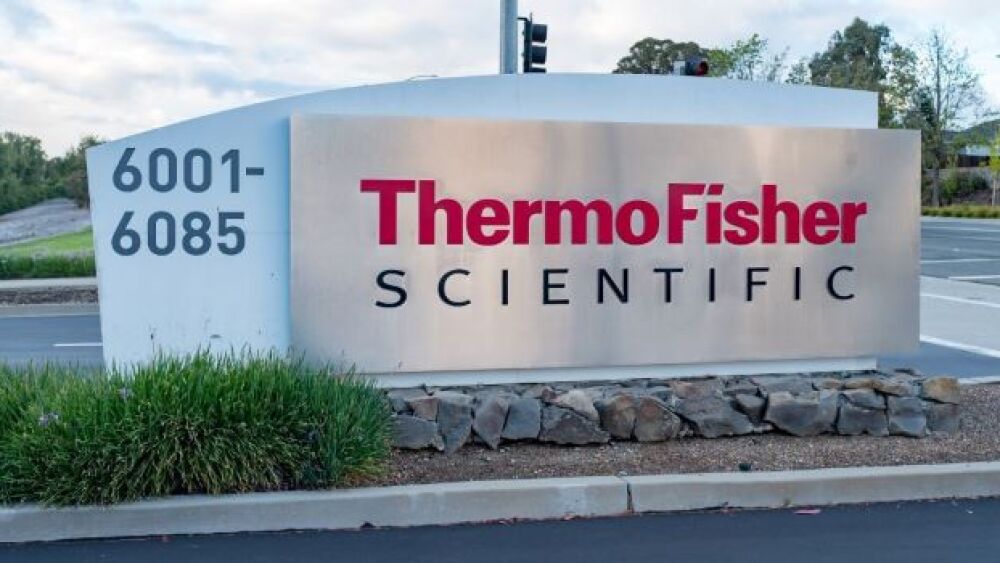Thermo Fisher Scientific announced the completion of Henogen SA, Groupe Novasep SAS’s viral vector manufacturing business in Belgium. The deal was for €725 million in cash.
Smith Collection/Gado/Getty Images
Thermo Fisher Scientific announced the completion of Henogen SA, Groupe Novasep SAS’s viral vector manufacturing business in Belgium. The deal was for €725 million in cash.
This is only the most recent news of Thermo Fisher’s push into the gene and cell therapy space. In March 2019, Thermo Fisher acquired Brammer Bio for $1.7 billion. Brammer Bio is a contract development and manufacturing organization (CDMO) focused on manufacturing viral vectors for gene and cell therapies. Brammer Bio is located in Cambridge, Massachusetts.
A month later, Thermo Fisher announced plans to invest $50 million in its manufacturing site in St. Louis County. The goal was to expand its manufacturing capabilities for biologic drugs. The expansion added 64,000 square feet to its factory at the intersection of Interstate 70 and Interstate 170, doubling its capacity at that site. In August 2017, Thermo Fisher bought Patheon for $7.2 billion. Patheon is also a CDMO.
This was underscored by a deal Thermo Fisher signed with Amicus Therapeutics in July 2019. Under that agreement, Thermo Fisher provided Amicus with immediate clinical and commercial manufacturing capabilities and capacity for Amicus’ intrathecal AAV Batten disease gene therapy programs. That deal had three components: first, the Batten disease programs, with R&D production technology and capabilities related to CLN6, CLN3 and other possible Batten disease programs transferred to and developed by Thermo Fisher’s viral vector business; second is the CLN6 Batten disease gene therapy; and the third was a plan to collaborate to develop platform manufacturing abilities for a broader portfolio of AAV gene therapy.
Industry reports indicate there are more than 300 gene and cell therapies in development, all of which require resources for viral vector manufacturing at different scales. Some vaccines, such as the COVID-19 vaccine developed by Johnson & Johnson and AstraZeneca-University of Oxford, utilize other types of viruses to deliver either genetic material of the COVID-19 vaccine or other viral antigens to the individual’s cells, so their immune systems can learn to identify the COVID-19 virus. In the case of the AstraZeneca vaccine, it is a chimpanzee adenovirus. For the J&J vaccine, it utilizes a weakened version of adenovirus 26, which is a common cold virus. Gene therapies and many cell therapies also use a variety of viruses, often adeno-associated viruses (AAV), to deliver genetic material into the body.
Novasep’s viral vector manufacturing business has two sites in Seneffe and Gosselies, Belgium, with more than 7,000 square feet of state-of-the-art clinical and commercial manufacturing operations.
“Novasep’s viral vector business is an excellent strategic fit as Thermo Fisher continues to expand its capabilities for cell and gene vaccines and therapies globally,” said Michel Lagarde, executive vice president of Thermo Fisher. “The addition of their manufacturing capabilities in Europe complements our four development and manufacturing sites in North America. In addition, they bring an incredibly talented team with more than two decades of experience across a broad range of viral vectors. The combination will benefit our global customers seeking support and capacity in the region as well as European customers bringing new medicines to patients inside and outside of Europe.”
The business will become part of Thermo Fisher’s Pharma Services business, which is within the Laboratory Products and Services Segment.
Novasep was founded more than 20 years ago. It had about 400 employees. Estimated 2020 revenue was about $95 million.
“Thermo Fisher is an outstanding partner for our viral vector business and its future development,” said Michel Spagnol, president and chief executive officer of Novasep. “Our diverse customer base will benefit from the combination of our viral vector services capabilities with the scale and capabilities of Thermo Fisher. Our talented employees will bring deep expertise to an organization that shares our commitment to providing groundbreaking new medicines to patients.”





